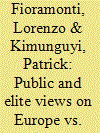| Srl | Item |
| 1 |
ID:
158438


|
|
|
|
|
| Summary/Abstract |
As Britain prepares to leave the European Union after the popular vote of June 2016, the government is embarking on the revision of foreign policy. Boris Johnson, or ‘just Boris’, has been entrusted with forging the new ‘Global Britain’ for the post-Brexit era and reinventing British economy around new relationships. Boris has a track record of misrepresenting and offending foreign peoples, leaders and countries. This article assesses the prospects for Africa in Johnson’s vision for ‘Global Britain’ as presented in his foreign policy speeches. The paper unpacks Johnson’s discursive construction of ‘Africa’ and inserts it into a broader historical and political context of British relations with Africa. It argues that, by constructing Africa as a ‘problem’ and offering liberal values as a condition for development, Johnson is continuing British imperial and post-colonial discourses of ‘developing’ or ‘civilizing’ Africa. In the post-Brexit world of a changing global balance of power, democratic conditionality serves to sustain and reproduce British forms of power and policies.
|
|
|
|
|
|
|
|
|
|
|
|
|
|
|
|
| 2 |
ID:
104297


|
|
|
|
|
| Publication |
2011.
|
| Summary/Abstract |
Europe has been the privileged economic and political partner of Africa, but more recently China has increased its foothold in Africa through important financial investments and trade agreements. Against this backdrop, the empirical research conducted in 2007-08 in Kenya and South Africa as part of a pioneering international project investigates the perceptions of public opinion, political leaders, civil society activists and media operators. While confirming their continent's traditional proximity to Europe, African citizens are increasingly interested in China and its impact on Africa's development. Europe is criticised for not having been able to dismiss the traditionally 'patronising' attitude towards Africa. While African civil society leaders and media operators describe China as an opportunity for Africa to break free of its historical dependence on European markets, other opinion leaders warn against too much enthusiasm for the Asian giant. There is a suspicion that the Chinese strategy might, in the long run, turn into a new form of economic patronage.
|
|
|
|
|
|
|
|
|
|
|
|
|
|
|
|